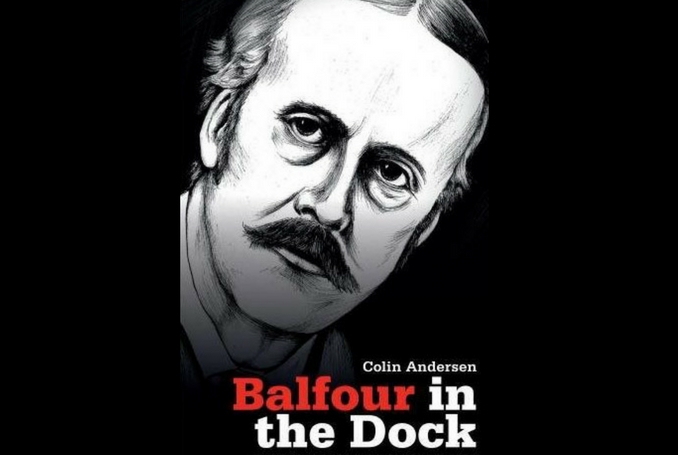
Reviewed by Jeremy Salt
(Colin Andersen, Balfour in the Dock. J.M.N. Jeffries and the Case for the Prosecution. Bloxham, Oxon: Skyscraper Publications, 2017)
J.M.N (Joseph) Jeffries was an outstanding British journalist whose book Palestine: The Reality (1939) is described by Colin Andersen as ‘a masterwork of history and a scathing indictment of British policy in Palestine from 1914 to 1938.’
George Antonius’ seminal work, The Arab Awakening, had been published only the year before but it is a more general account of British betrayal of the Arabs, whereas the value of the Jeffries book lies in his single-minded focus on Palestine and the force of his arguments. Few copies of the book were printed, and it is now almost impossible to find even in libraries. By Edward Said and many others, however, its value as an early exposure of British perfidy has long since been recognized.
Zionism itself was a wicked idea from the start. Herzl was not ignorant of the realities on the ground in Palestine. In the form of the people, he wanted to remove them and in the form of the land he wanted to turn Palestine into something else. Chaim Weizmann was no better. He lied, deceived and dissimulated as a matter of course. By 1914, with one exception, Zionism had no support anywhere. The Ottoman sultan, the Kaiser, and the Tsar’s government had all turned their backs on it. By Jews around the world, the Zionists were regarded as cranks, fanatics, and heretics but the one exception was critical. In Britain, the seed of imperial support for this mad idea had been sown by Joseph Chamberlain, the Colonial Secretary, when in 1903 he backed Zionist settlement in East Africa.
By 1917 Zionism had been absorbed into British imperialism. The motive was not gratitude for Weizmann’s chemical research in support of the war effort or anything as fanciful as sympathy for a persecuted people bent on returning to their ancient homeland but the recognition that Zionism was a tool Britain could use. The chief villains of the piece, in Jeffries’ reading, were the British Prime Minister, David Lloyd George, and his Foreign Secretary, Arthur James Balfour, both of whom, to use a term now current, ‘weaponised’ Zionism, first to bring the US into the war and then to turn Palestine over to their Zionist proxies, much as the US, Britain, France and their ‘allies’ have tried hard over the past seven years to put Syria in the hands of their takfiri proxies.
It was Jeffries, an outstanding correspondent for the London Daily Mail, who in 1923 exposed the deception deliberately built into Sir Henry McMahon’s correspondence with the Sharif Husayn of Mecca in 1915. The Sharif had outlined the area in which the Arabs were to be granted independence in return for supporting the British war effort. McMahon made specific exceptions for Mersin and Alexandretta (Iskanderun) and ‘portions of Syria lying to the west of the districts of Damascus, Homs, Hama and Aleppo, which cannot be said to be purely Arab.’ The excluded region had a substantial Christian percentage, but in line with its imperial tactics of divide and rule Britain chose to regard only Muslims as ‘Arab’ despite the role Christians played in the formulation of the Arab national idea.
This region ‘west of Damascus’ was the coastal littoral Britain intended to allocate to France in Sykes-Picot the following year but on no map, can Palestine be found west of Damascus. Homs and Hama are mentioned but not Jerusalem, for the obvious reason that the British knew that the Sharif Husayn would never agree to its exclusion from the area set aside for ‘Arab independence.’ Although Antonius is given the credit he deserves for exposing the depth of deceit in the McMahon letters to the Sharif Husayn, it was Jeffries, in articles written for the Daily Mail in 1923, based on a copy of the text he had been given by King Feisal, who first brought this deception to the attention of the British public.
The Husayn-McMahon correspondence was followed in 1916 by the treachery of Sykes-Picot and in 1917 by the further treachery of the Balfour declaration, a pledge not just made to the Zionists but largely written by them. Behind the caviling and declarations of nothing but good intentions, Jeffries knew exactly what they were up to the formula of a ‘national home’ was adopted for the time only because pressing for statehood would be regarded even by the British government as too provocative. The ‘country without a people for a people without a country’ was a brazen lie which the Zionists pretended to believe because they did not want the Palestinians to be there. They were being wished away psychologically long before they could be removed physically. As Jeffries was to write, they were nobodies who would eventually ‘vanish like mist before the sun of Zion.’
Behind his lofty, somewhat detached philosophical exterior, Balfour was as remorseless as the fanatics whose cause he was promoting, not in their interests, as they undoubtedly realized, but Britain’s. Zionism, he wrote in 1919, right or wrong, good or bad, was rooted in traditions, present needs and future hopes of ‘far profounder import than the desires and prejudices of the 700,000 Arabs who now inhabit that ancient land.’ Crucially, the words ‘now’ and ‘inhabit’ point to what Balfour, the British government, and the Zionists, colluding, had in mind: Palestine did not belong to the Palestinians, they were only ‘inhabiting’ it and only for ‘now.’ In the same statement Balfour, in a rare moment of truth, wrote that insofar as Palestine was concerned ‘the Powers have made no statement of fact which is not admittedly wrong and no declaration of policy which, at least in the letter, they have not always intended to violate.’
In Palestine: The Reality Jeffries traced Balfour’s declaration from inception through gestation to birth. As Colin Andersen writes, far from being a pure and lofty initiative of the British government, the declaration was in its drafting ‘very much an Anglo-Zionist-American affair.’ The process began ‘in earnest’ in June 1917, when Weizmann, Lord Rothschild, and Sir Ronald Graham, assistant undersecretary at the Foreign Office, visited Balfour, who had just returned from a five-week visit to the US, where he met the leading US Zionist, Supreme Court Justice Louis D. Brandeis. The question of a declaration on Palestine was discussed and after seeing Weizmann and Rothschild back in London, the drafting began, as Jeffries was to write, ‘on both sides of the Atlantic.’
It remains very worthwhile to consider how these drafts changed. As documented by Jeffries, in its first draft, prepared in July 1917, the British government spoke of Palestine being recognized as ‘the National Home of the Jewish people’, with the conditions of their ‘national life’ being determined with representatives of the ‘Zionist Organization.’ There is no mention of the theme dwelt upon by Balfour and others in the government of historical Jewish suffering and the need for a refuge and neither is there any mention of the majority of the population – Arab – actually living in Palestine.
On July 18 the Zionists produced their amended version in which Palestine would be ‘reconstituted’ as the national home of the Jewish people. In August Lord Milner, a senior figure in the government prepared a draft removing ‘reconstituted’ and referring to ‘a’ Jewish national home ‘in’ Palestine. This was approved by Balfour but opposed by Edwin Montagu, Secretary of State for India, both Jewish and anti-zionist, who described Zionism as a ‘mischievous political creed’, who said there was no Jewish nation and even argued that Zionism should be declared as illegal ‘and against the national interest.’ By longing for the day when he could ‘shake British soil from his shoes’ and go to Palestine, the British Jew would have acknowledged aims inconsistent with British citizenship and admitted that ‘he is unfit for a share in public life in Great Britain or to be treated as an Englishman.’ At a Cabinet meeting on October 4, Montagu again objected vigorously, with the support of Lord Curzon, who asked ‘How was it proposed to get rid of the existing majority of Mussulman inhabitants and to introduce the Jews in their place?’
In Washington on October 13, President Wilson approved to have the British draft, clearly without spending much time thinking about it. Back in London, a reworded draft referred to the British government viewing with favor the establishment in Palestine of a national home for the Jewish ‘race’, a phrase as bereft of any logic, historical or otherwise, as the Jewish ‘people’ or ‘nation.’ This time, however, the draft referred to the civil and religious rights of ‘existing’ non-Jewish communities in Palestine – the Palestinians, 90 percent of the population- as well as the rights of Jews elsewhere who were content with their existing nationality ‘and citizenship’, Balfour added.
This draft was also approved by Wilson. Alterations at the behest of Louis Brandeis led to further rewording, especially ‘people’ instead of ‘race.’ The reference to the rights of the ‘existing non-Jewish communities’ raised objections from the Zionists. How could anyone think that they could be damaged by the establishment of a national Jewish home? After all, did not Jewish religious tradition prescribe that the stranger must be looked after? In their inverted world, it was the stranger, themselves, who owned the land and the true owners, individually and collectively, the people of Palestine, who were the strangers, not that the Zionists had any intention of looking after them or even sharing the land. They wanted to get rid of them.
The final form of the declaration was approved by the War Cabinet on October 31 and issued on November 2. It ends with Balfour’s request to Lord Rothschild to bring the declaration to the notice of the Zionist Federation. Nothing more cynically humorous had ever been penned than these two lines, wrote Jeffries, seeing that the Zionists had collaborated in drafting the declaration: in its final form it would never have been issued without their approval. Jeffries describes the document as the most discreditable produced by a British government in living memory.
He follows a trail spotted with lies and deceit to where it led after the war, to a mandatory administration of Palestine top-heavy with Zionists and Palestine resistance to the Anglo-Zionist occupation of their land. By 1937 the Peel report was recommending partition and transfer of part of the Palestinian population, a solution which the Zionists wanted not in part but full but part would at least be a start. Wrote Jeffries: ‘How can anyone suggest that about a quarter of the Arab population should be removed by force from the land which they and theirs have occupied for centuries?’
Colin Andersen, blending original material from Palestine: The Reality and Jeffries’ other writings with his own analysis and interpretation, has produced a book that no student of Britain’s deceits from Husain-McMahon to the Balfour Declaration should leave unread. There is a broader context, of course. In 1917, as the Balfour Declaration was being prepared and the world was reacting to the Bolshevik revolution, Lloyd George was giving assurances to the British labor movement that territorial annexation was the last thing the government had on its own mind.
The British were sick of war and the government was alarmed at the effects of the Bolshevik revolution, at a time it needed to ‘comb out’ more working-class men of fighting age to send to the front. They had to be deceived. In December 1917, addressing trade union leaders, Lloyd George asserted that ‘our one object in the war was to defend the violated public law of Europe, to vindicate Treaty obligations and to secure the restoration of Belgium.’ The release by the Bolsheviks of the contents of Sykes-Picot on November 23 had been an embarrassment but the Labor Party could still issue a statement praising Lloyd George, whose speech had revealed ‘a government and a people seeking no selfish or predatory aims of any kind, pursuing with one unchanging mind, one unchanging purpose: to obtain justice for others so that we thereby secure for ourselves a lasting peace. We desire neither to destroy Germany or diminish her boundaries: we seek neither to exalt ourselves nor to enlarge our empire.’
The immense harm which has been done to the Palestinians also has to be set in a broader regional context. The partition of Arab lands was of a piece with the planned partition of Anatolia, where the powers planned to establish a Christian Armenian ‘protectorate’ in eastern provinces where the population was 80 percent Muslim. In 1919 Lloyd George was the principal architect of the Greek invasion of western Anatolia, which was not to end, after great loss of life and massive destruction, until 1922. In the same year the British government launched the ‘war of intervention’ against the Bolsheviks: in the 1930s it launched the war of non-intervention against the republican government of Spain as well as enabling the Italian invasion of Ethiopia and the Japanese invasion of China. Class and money interests of the British establishment took precedence over national interests (not that by this same establishment they were seen as being any different).
We can see continuity in the leading role Britain has played in the destruction of Iraq and Libya and the devastation of Syria by armed proxies over the past eight years, up to the missile attack of April 14. The record of lies, deception, intimidation, and aggression all the way since 1915 is practically seamless. We can only imagine what a journalist of the caliber of J.M.N Jeffries would have made of all this.
– Jeremy Salt taught at the University of Melbourne, at Bosporus University in Istanbul and Bilkent University in Ankara for many years, specializing in the modern history of the Middle East. Among his recent publications is his 2008 book, The Unmaking of the Middle East. A History of Western Disorder in Arab Lands (University of California Press). He contributed this article to PalestineChronicle.com.








I have one small and joyful correction to make to Mr. Salt’s review. Apparently the Jeffries family allowed the re-issue of the original book in paperback. It was published in 2017 in the US by Olive Brance Press. I read an original that I obtained through inter-library loan and am happy to finally own a copy. It is worth buying.
Hello Mr Emerson … thanks very much for pointing this out. I should have mentioned other exceptions to the disappearance of the book, as detailed by Colin Anderson in his chapter ‘Reality Goes Missing.’ One was the Arabic translation by Ahmad Khali al Haj, appearing in 1971 as Filistin: Ilaykum al Haqiqah, and the other the book’s republication in 1976 by Hyperion Press, of Westport, Connecticut. Readers might like to chase one of these versions up
Howard, FYI, I make this point at p 4 in the introduction to ‘Balfour in the Dock’ “Despite the book’s great significance… it is all but impossible to find an original copy today. In terms of library copies in the UK, the British Writers in Support of Palestine blog estimates only ’21 possible copies’ in existence. Any attempt to procure a copy online is invariably greeted by the message ‘Currently unavailable.’ (Fortunately, however, this long eclipse is now over; Palestine: The Reality has been republished this year by Skyscraper Publications in the United Kingdom and Olive Branch Press in the United States.”
The Jeffries book is a must-read, and I will definitely read Colin Andersen’s history, which seems to go close-up on just a few years and can thus dig deep.
I truly don’t want to spoil the party, but at times when I am researching the Mandate (and pre-Mandate) period I have to keep myself from making the story one about Great Britain (and all its arrogant, racist officials like Balfour, Churchill et al) instead of one about Palestine. For me an example is getting too caught up in the McMahon-Hussein controversy, because what Britain did wrong was not necessarily lying, or breaking promises, but rather the underlying thing: denying Palestinians self-determination.
I hope this makes sense.
Blake, as Jeffries makes abundantly clear, McMahon’s letter of 24/10/15, accepting Hussein’s terms constituted nothing less than a treaty commitment, which was subsequently betrayed when the British secretly entered into the Sykes-Picot Agreement with France in 1916, and then issued the Balfour Declaration in 1917. Compounding the betrayal, the latter was incorporated into a Palestine Mandate, awarded to Britain by Britain at San Remo in 1920 in clear violation of Article 22 of the Covenant of the League of Nations, which stipulated that the wishes of the people concerned – in this case the Palestinian Arabs – “must be the principal consideration in the selection of the Mandatory.”
As for Palestinian self-determination, Balfour said it all in a 1919 memorandum: “The Four Great Powers are committed to Zionism. And Zionism, be it right or wrong, good or bad, is rooted in age-long traditions, in present needs, in future hopes, of far profounder import than the desires and prejudices of the 700,000 Arabs who now inhabit that ancient land.”
Could you please provide me with author andersen email.